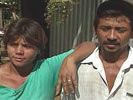Eye For Film >> Movies >> Rosita (2005) Film Review
Horrific, heart-breaking and yet also hopeful, Rosita is a must-see piece of film-making.
It tells the story of nine-year-old Nicaraguan girl Rosita, who falls pregnant as the result of a rape. Backed by some medics, her distraught parents fear the pregnancy will kill her and leave her mentally scarred and want her to have an abortion – which is illegal unless the mother’s life is in danger.

Other doctors claim she can complete her pregnancy. Pressure from them, the Catholic Church and the Nicaraguan and Costa Rican government soon begins to heap on the family.
The film traces Rosita's long, terrifying battles with the ruling powers and immense pressure from the church – including being excommunicated – in order to achieve “therapeutic” abortion.
Despite all the odds, Rosita goes from victim to victor and her battle could help other young victims. Rosita’s story is told chronologically, in English, as told to writer Maria Lopez Vigil.
The documentary also features interviews with her parents, lawyers, doctors, the human rights activists who helped her and the archbishop who demanded she keep the child.
It is incredibly moving, especially when her parents reveal graphic, horrific details of the rape and how she didn’t understand what had happened. I wept as they explained how she feared she would get into trouble if she told how she had been violated.
We never see Rosita herself, in accordance with her parents’ wishes, but her prescence is felt strongly. The film-makers cleverly turn some of her drawings from the time into little animations. We see Rosita playing with her parents, crying in her hospital bed and her seeing the sun coming out after a storm.
There are also lots of shots of young girls Rosita’s age as the story unfolds. They are playing innocently, helping their parents, walking to school. They represent her and could be her - any child could have fallen victim.
Although those opposing Rosita’s abortion are given their say, the film is firmly biased towards the child. At the end, the film cleverly sets this point of view instone. A cabbie - an everyman representative of the Nicaraguan people – says most people opposed the abortion. It was a crime. He is asked if he would still think that if it was his daughter. His silence speaks volumes, then he admits he doesn’t know. “She’s only nine.”
Overall, Rosita is an extremely powerful piece of human rights propaganda that would make everyone, no matter how against abortion, concede that in certain situations it must be an option. Hopefully it will help change attitudes and help the Rositas of the future.
Reviewed on: 02 Mar 2007














